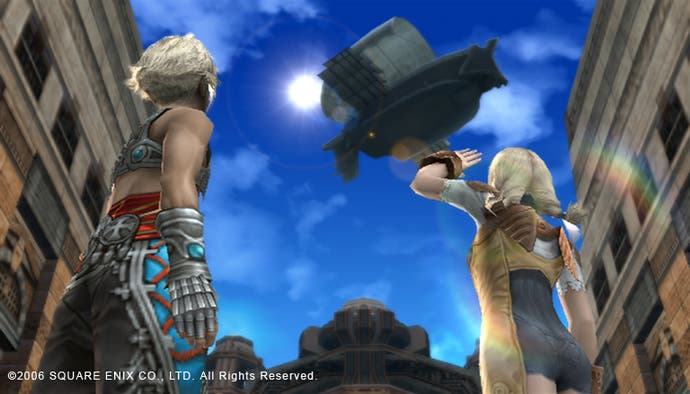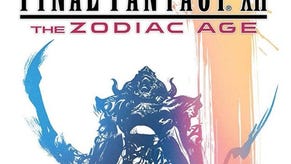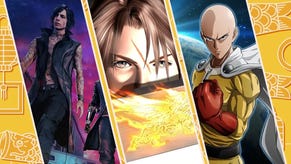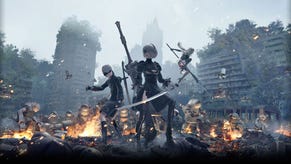Final Fantasy XII
Nothing lasts... But nothing is lost.
Around the World
The changes to the battle system are matched by a major overhaul of how characters develop their skills throughout the game. Each character now measures their progress on a License Board, a special screen looking rather like a deformed chess board where you can unlock new skills and abilities by spending LP (earned through battle) on uncovering squares next to previously revealed ones. However, licenses - as the name suggests - only allow you to use specific items and skills; you still have to acquire the relevant items and skills by yourself.
The most major consequence of this is that character development is, largely speaking, up to the player. Every character starts in almost the same place on the License Board, and it's your choice whether you want to specialise in any given field with any given character. The game certainly nudges you in specific directions on this front, but the final decision is down to you; and while it may be tempting to make every character into a bit of an all-rounder, the most powerful and balanced party will be one where characters specialise to a high degree in certain fields.
This, in a sense, answers the common criticism of Japanese role-playing games - namely that despite the "role-playing" moniker, the games offer little chance to do anything other than steer pre-rolled characters through a semi-interactive story. It's a fair criticism, albeit one which ignores the fact that for many players, that's quite an attractive prospect; however, Final Fantasy XII skilfully finds a middle ground, giving the chance to customise your characters to a vast degree, as well as presenting a huge number of side-quests and distractions in the form of monster hunting bounties and quests for your in-game clan, while simultaneously providing a superb, epic storyline that will more than satisfy any fan of interactive storytelling.
This storyline, in a sense, is one of the most brave departures of FFXII; even by comparison with the changes to the battle system, it still stands out as being in strong contrast to the recent outings of the series, and harks back strongly to Final Fantasy games prior to the PlayStation era. Although after the intro sequence, it takes some time to get off the ground, and players may initially be somewhat dismayed to find themselves largely following around the cheerful prettyboy Vaan - seemingly desperately in need of a clip around the ear - but within a matter of a couple of hours, new characters have been introduced who fill out the cast superbly and make it clear that this is not to be the tale of one troubled boy's journey to save the world. This is very clearly an ensemble cast, with each character being equally deserving of the claim to be a central figure in the plot - and with the full cast introduced early in the game, the writers can avoid the weak plot device of introducing new characters late on, and instead focus on weaving fascinating narrative and revealing superb back stories for the existing cast.

In this regard, FFXII harks back to games like Final Fantasy V, with a cast of characters who are not mere misfits on a world-renewing quest, but rather are powerful figures in a world which is politically charged and filled with complex forces and influences. More importantly, perhaps, it also speaks of a game which has learned lessons from the best television series of recent years; although the timing of the development of the game doesn't fit with any claims of influence from these series specifically, it's easy to draw parallels with some aspects of the storytelling in series such as Lost and Ron Moore's updated Battlestar Galactica. The dialogue, too, sparkles in many places - assisted ably by a strong voice cast which uses many English and Scottish actors to provide a wide mix of accents, and which helps it to avoid most of the American voice-acting stereotypes (and, indeed, often dreadful American voice acting "talent") which have devalued the storylines of previous voiced RPGs.
If any criticism were to be made of the storytelling and the world it weaves, it would be that the team has perhaps gone overboard in its presentation of the world of Ivalice; there are elements to the tale which cannot hope to be wrapped up in a single game, even a massive game of this scope. That, perhaps, is the point; already a follow-up title has been announced, and of course, the world of Ivalice previously featured in the Final Fantasy Tactics series (from whose GBA incarnation several elements are drawn, including the clan system and even a few characters) and in Vagrant Story. The lore being built up around this universe is fascinating, and it's telling that the announcement of Revenant Wings, the DS continuation of FFXII, is being welcomed rather than viewed with cynicism by those who have completed the original game.
A New Way

It's difficult to find holes to pick in Final Fantasy XII; the pacing could be better in places, especially at the start, and until you get used to the fact that very tough monsters roam the same plains as very easy monsters in several places, the difficulty curve can seem extremely punishing - but running away with your tail between your legs when it's appropriate solves that problem quickly enough. However, minor problems like that are quickly pushed aside in face of the fact that FFXII is a brave and superbly well-executed rethink of the entire JRPG genre which the Final Fantasy series did so much to define in the first place.
In fact, the most accurate comparison for this game is with Resident Evil 4 - another game which broke the mould not only of a series, but of a genre which it had itself defined in the past, and delivered a stunning experience that attracted many new players to the series in the process. Final Fantasy XII should do exactly that also. People turned off by random encounters, by turn based battles or by the occasionally excessively teen-angst laden storylines of the last few games will find this game fully deserving of a chance; while fans of the series concerned that nothing lasts will find that nothing is lost, either. This is distinctly a Final Fantasy game, and distinctly one of the pinnacles of the series to date; but yet it is distinctly different, experimental, and bold.
It's not hard to see us looking back in five years time and seeing FFXII as a pivotal, changing moment in how RPGs are designed; a game which drew on the experience of Final Fantasy's branches into tactical strategy and massively multiplayer, as well as on the more mature storytelling of other mediums, and folded it back into the number series, to wonderful result. Fans will, of course, debate the merits of Final Fantasy XII for a long time - but our own experience with this game fully justifies giving it the highest accolade we can award.








